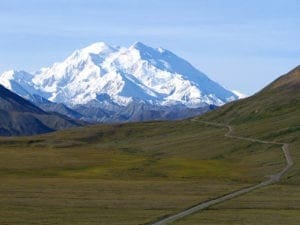Renaming Mt. McKinley: An Otherwise Silly Controversy Because of Executive Overreach
This article was featured in our weekly newsletter, the Liberator Online. To receive it in your inbox, sign up here.
On Monday, the United States Department of the Interior announced that it would change the name of Mt. McKinley, located in Alaska, to Denali. The name change reflects the decades-old wishes of the state, but Ohio Republicans are miffed because they see it as a sign of disrespect toward President William McKinley, who hailed from the Buckeye State.
 With a prominence 20,128 feet, Denali is in the highest mountain peak in Northern America and the third highest in prominence the world, behind only Nepal’s Mt. Everest and Argentina’s Aconcagua. In 1917, Congress named it Mt. McKinley in honor of McKinley, who was assassinated in 1901, not long after beginning his second term in office.
With a prominence 20,128 feet, Denali is in the highest mountain peak in Northern America and the third highest in prominence the world, behind only Nepal’s Mt. Everest and Argentina’s Aconcagua. In 1917, Congress named it Mt. McKinley in honor of McKinley, who was assassinated in 1901, not long after beginning his second term in office.
McKinley wasn’t connected to the mountain in any meaningful way, as the Department of Interior’s statement explains: “President McKinley never visited, nor did he have any significant historical connection to, the mountain or to Alaska.”
Alaska was a territory when McKinley was president. The United States purchased the land from Russia in March 1867 and took possession of it in October 1867, under President Andrew Johnson’s administration. It wouldn’t be granted statehood until January 1959, during the Eisenhower administration.
Originally named Mt. McKinley National Park, the park in which the mountain rests was created by the same act of Congress, signed by President Woodrow Wilson in 1917, which named the mountain after McKinley. It was renamed Denali National Park and Preserve in December 1980, in one of President Jimmy Carter’s final acts in office.
Legend has it the mountain was named after McKinley as a jab at William Jennings Bryan’s supporters. Bryan, the Democratic Party’s nominee in 1896 and 1900, was a supporter of “free silver” movement. McKinley, a Republican and a backer of the gold standard, was his opponent in both elections. Bryant lost both elections.
James Pethokoukis, writing at The Week, speculated that President Barack Obama might have signed off on the name change to “troll” current supporters of the gold standard. Pethokoukis is a critic of the gold standard, so take it for what it’s worth. Likewise, Ohio Republicans consider it a slight at McKinley. Speaker John Boehner, R-Ohio, said he is “deeply disappointed in the decision.”
“There is a reason President McKinley’s name has served atop the highest peak in North America for more than 100 years, and that is because it is a testament to his great legacy,” said Boehner. “McKinley served our country with distinction during the Civil War as a member of the Army. He made a difference for his constituents and his state as a member of the House of Representatives and as Governor of the great state of Ohio. And he led this nation to prosperity and victory in the Spanish-American War as the 25th President of the United States.”
Locals call the mountain as Denali, which is Athabaskan for “the high one.” No, it’s not Kenyan for “black power,” as the absurd meme making the rounds on Facebook says. In 1975, as well as subsequent years, Alaska asked the federal government to rename the mountain Denali, but Washington hasn’t listened to the requests. Alaska’s congressional delegation expressed support for the name change.
“Denali belongs to Alaska and its citizens. The naming rights already went to ancestors of the Alaska Native people, like those of my wife’s family. For decades, Alaskans and members of our congressional delegation have been fighting for Denali to be recognized by the federal government by its true name,” said Sen. Dan Sullivan, R-Alaska. “I’m gratified that the president respected this.”
Still, though, one of the criticisms of the name change is the administration acted without proper authority. The Department of the Interior cites 43 U.S.C. §364(b) as its authority to make the change. The statute, which deals with policies and procedures of the United States Board on Geographic Names, states: “Action may be taken by the Secretary in any matter wherein the Board does not act within a reasonable time.”
Given that Denali got its original name through an act of Congress, some are crying that the renaming of the mountain is an example of executive overreach. Sen. Rob Portman, R-Ohio, for example, said the change is “yet another example of the President going around Congress.”
Ed Morrissey, a blogger at the conservative space, Hot Air, also complained about the power grab. “[I]t’s an arbitrary and capricious use of executive power in pursuit of a petty end. The federal government controls vast swaths of Alaska land, and Congress should exercise joint authority over it with the executive branch,” Morrissey opined. “We seem to be getting farther and farther from that concept.”
“This may be a comparatively minor and frivolous example of that problem, but in one way that makes this even worse. One might understand an executive overstep in an emergency or to secure the nation, but …. renaming a mountain?” he added.
The name of the mountain matters not, unless you’re a Republican from Ohio, apparently. The use of executive power, though, is a legitimate criticism in light of this administration’s expansionist of view of its constitutional authority. The next president can call it Mt. Sarah Palin if they want as long as they go through Congress to do it.

























